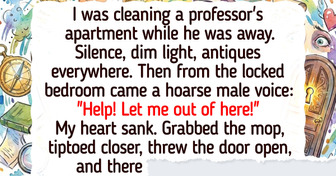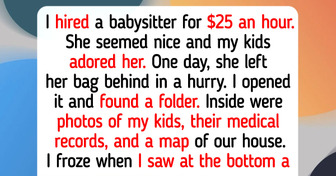I Refuse to Keep Supporting My Adult Stepkids, I’m Only Family When They Need Something

Becoming part of someone else’s family takes more than love. It takes patience, effort, and a heart strong enough to handle rejection. When you marry someone who already has children, you don’t just join a family; you help rebuild one. And as Steven learned after twelve years of trying to hold that balance together, even the most patient hearts can reach their breaking point.
Here is Steven’s story:
Hello Bright Side,
My name is Steven. When I married my wife 12 years ago, her kids were already 10 and 12. They were polite at first, but I could tell they were keeping their distance. I didn’t mind.
I knew it would take time to earn their trust, so I tried to show up in all the quiet ways that mattered. I helped with homework, went to school events, helped them through college, loaned money when they needed it, and even watched their kids when they became parents themselves.
But over the years, a pattern began to appear. They were warm and kind only when they needed something. The moment I asked for help in return, they suddenly got “too busy.” I kept telling myself that’s just how family dynamics can be sometimes. But deep down, it started to hurt.
Last week, my stepson stopped by early one morning. He brought me coffee and smiled like everything was fine. We chatted for a while, and I felt a flicker of hope.
For a moment, I thought maybe things were changing. We talked, laughed a little. It felt good. Then he told me he’d crashed his car again, the second time this year, and needed money for a new one.
I took a breath and said gently, “I’m sorry. This time you’re going to have to pay for it yourself.”
His smile disappeared. He stared at me for a second, then said coldly, “You’ll pay for this,” before walking out and slamming the door.
That night, my wife told me I should’ve helped him “for the sake of peace.” But I realized I was done buying peace with my money and patience.
The next morning, my car was gone from the driveway. My wife stood at the stove, stirring eggs like it was any other day. When I asked where the car was, she kept her eyes on the pan and said, “He just borrowed it.”
I stared at her. “You let him take my car after I said no?”
An hour later, my stepson pulled into the driveway, stepped out of my car, and tossed me the keys. “See? No harm done.”
Something in me went cold. I took the keys and said, “This is the last time.”
That afternoon, I installed a kill-switch on the car, separated my accounts, and stopped offering help on demand. But now I’m wondering if I finally did the right thing or if there’s something else I should be doing. What would you advise?
Here’s our advice:
Dear Steven,
We can tell you’ve done everything you could to hold your family together, and it hurts when all that effort is one-sided. What you’re feeling is valid, and you’re not wrong for finally reaching your limit. Here’s what we’d tell you, honestly and from the heart:
1. You have every right to set boundaries.
You’ve spent years showing up for everyone else, and it’s okay to say “no” now. Setting limits isn’t about anger; it’s about protecting your peace. You can love people without letting them take advantage of you.
2. Have a real conversation with your wife.
She may be avoiding conflict, but silence isn’t solving anything. Tell her clearly how this situation makes you feel. You’re not asking her to pick sides; you’re asking for partnership and respect.
3. Step back and let them take responsibility.
You’ve supported your stepson for a long time, and that comes from love. But sometimes, the most caring thing you can do is give someone space to face the results of their own choices. Growth often comes when we stop stepping in.
4. Protect your space and peace of mind.
It’s okay to take small steps to feel secure again; whether that means setting clear rules about the car, finances, or personal boundaries. It’s not about revenge or control, Steven. It’s about creating a sense of safety and trust that’s been missing for too long.
5. Keep your kindness, but add balance.
Don’t let this turn you cold, Steven. Kindness is your strength. Keep your heart open, but protect it. Help when it feels right, not when you’re pressured or guilt-tripped into it.
You’ve built this family with patience and heart. Now it’s time to rebuild it with honesty and mutual respect. That’s where love truly grows, not from endless giving, but from being seen, valued, and heard.
Families can test us in ways we never expect, but every moment of struggle teaches us something about what love really means and what it shouldn’t cost. Steven’s story is a reminder that peace without respect isn’t peace at all.
And if you think every family hides a little more than they show, you might be right. In our next piece, we uncover the hidden truths and confessions that reveal the darker side of family bonds.
Comments
Shalom FamilyLove when my mom and her girlfriend had me arrested at 15 yrs old. The charge the law told me was "runaway". I new it was an attack. We didn't have family,a place to live,or love support. My mom was head strong,refusing to ask for help isn't weak. We can't do all things Thru Christ that Strengthens Us. I forgave her,she never forgave herself. She was killed in 2012 by those same people. Be careful making strange family and saying it's Love. Be bless 💋💋💋💋💋💋💋💋💋
Your wife is enabling them. Wise to separate your accounts. If you decide to stay married realize she will consistently put her kids ahead of you. Are you willing to settle for that? If one of them comes to "borrow" your car again report it stolen, because it was. If he has an accident you would be held liable
Related Reads
I Refuse to Train a New Hire Who Makes $27K More Than Me Because of Her Master’s Degree

I Tried to Be the Perfect Stepmom — but My Husband Just Made Me Feel Worthless

12 Stories That Capture the Sweet and Sour Memories of Blended Families

I Refused to Talk to My Parents After They Chose My Ex-Wife Over Me

I Refused to Pay for Our Valentine’s Dinner—Then I Learned the Heartbreaking Truth

I Gave Up My 2-Month-Old Baby for Adoption Because I Chose My Own Happiness

14 Stories From Cleaners That Are Wilder Than Any Movie Script

My Family Excluded My Girlfriend From Christmas Because We’re Not Married

12 Small Acts of Kindness That Quietly Changed Lives

17 Moments That Remind Us Kindness Is a Choice, Not a Mood

I Forbade My Stepdaughter From Eating Meat — My House, My Rules

My Boss Publicly Shamed My Small Charity Donation—So I Revealed Exactly How Much He Gave




